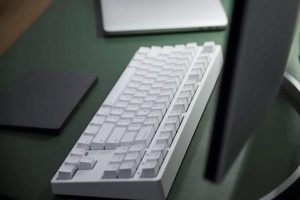When it comes to keyboards, most people are using the ones with a membrane. If I told you that you should switch to a mechanical keyboard, it might sound counterintuitive, but there are a couple of reasons for that.
Mechanical keyboard technology might be older than membrane technology, but the benefits they offer are not easily ignored. Membrane keyboards are made to be cheaper and more affordable, but here are the reasons why you should at least consider spending a couple of bucks to get a really good mechanical keyboard.
Mechanical Keyboards Last Longer

If you replace your membrane keyboard for a mechanical one, you will surely get a bang for your buck. On a membrane keyboard, when you press a key, it passes through a plastic layer containing electrical contacts. This interrupts the circuit and registers the keypress. Mechanical keyboards, on the other hand, use the real switch below a key to register if a key is pressed.
The membrane keyboard clocks out at about 10 million key presses and when the membrane or the circuit board gets damaged, you have to replace the whole keyboard. The mechanical keyboard-only stops working after about 50 million presses, and the keys are easily replaceable. This means that even if you have to spend more money on a mechanical keyboard, it’s worth every penny as they can last for decades.
Mechanical Keyboards Give You a Better Feedback

If you want to get better at typing and put less strain on your fingers, then a mechanical keyboard is the right choice for you. While membrane keyboards feel mushy when you press the keys, typing on a mechanical keyboard gives you the feedback you can feel. This makes it easier for you to keep track of your finger position and lowers the chance of mistyping.
Other than helping you achieve faster typing, it will also eliminate the chance of pushing the button all the way down which puts a strain on your fingers, making them tire more easily. Faster typing is also achieved because there is a lower chance that you will just graze the wrong key and the keyboard registers it as a keypress.
Mechanical keyboards also produce a clicking noise each time a keypress is registered. You will naturally learn when the key is pressed, and move on to the next key, increasing your typing speed even more in the process.

